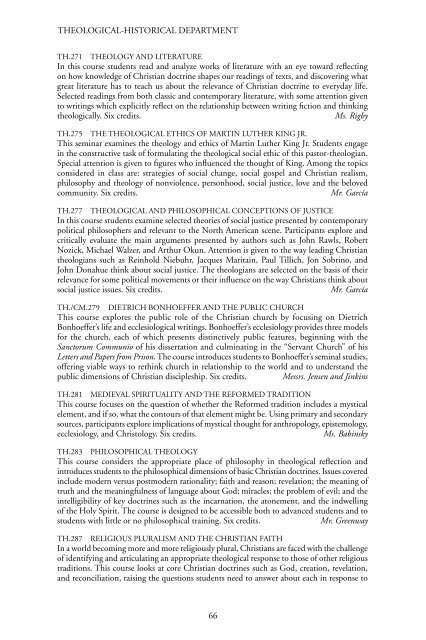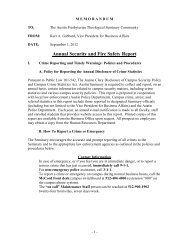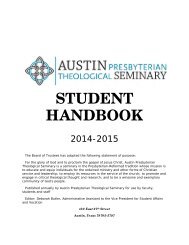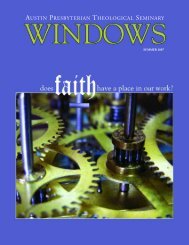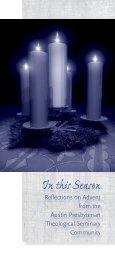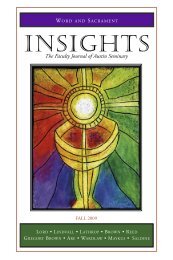Catalogue 2008 Book - Austin Presbyterian Theological Seminary
Catalogue 2008 Book - Austin Presbyterian Theological Seminary
Catalogue 2008 Book - Austin Presbyterian Theological Seminary
You also want an ePaper? Increase the reach of your titles
YUMPU automatically turns print PDFs into web optimized ePapers that Google loves.
THEOLOGICAL-HISTORICAL DEPARTMENT<br />
TH.271 THEOLOGY AND LITERATURE<br />
In this course students read and analyze works of literature with an eye toward refl ecting<br />
on how knowledge of Christian doctrine shapes our readings of texts, and discovering what<br />
great literature has to teach us about the relevance of Christian doctrine to everyday life.<br />
Selected readings from both classic and contemporary literature, with some attention given<br />
to writings which explicitly refl ect on the relationship between writing fi ction and thinking<br />
theologically. Six credits. Ms. Rigby<br />
TH.275 THE THEOLOGICAL ETHICS OF MARTIN LUTHER KING JR.<br />
This seminar examines the theology and ethics of Martin Luther King Jr. Students engage<br />
in the constructive task of formulating the theological social ethic of this pastor-theologian.<br />
Special attention is given to fi gures who infl uenced the thought of King. Among the topics<br />
considered in class are: strategies of social change, social gospel and Christian realism,<br />
philosophy and theology of nonviolence, personhood, social justice, love and the beloved<br />
community. Six credits. Mr. García<br />
TH.277 THEOLOGICAL AND PHILOSOPHICAL CONCEPTIONS OF JUSTICE<br />
In this course students examine selected theories of social justice presented by contemporary<br />
political philosophers and relevant to the North American scene. Participants explore and<br />
critically evaluate the main arguments presented by authors such as John Rawls, Robert<br />
Nozick, Michael Walzer, and Arthur Okun. Attention is given to the way leading Christian<br />
theologians such as Reinhold Niebuhr, Jacques Maritain, Paul Tillich, Jon Sobrino, and<br />
John Donahue think about social justice. The theologians are selected on the basis of their<br />
relevance for some political movements or their infl uence on the way Christians think about<br />
social justice issues. Six credits. Mr. García<br />
TH./CM.279 DIETRICH BONHOEFFER AND THE PUBLIC CHURCH<br />
This course explores the public role of the Christian church by focusing on Dietrich<br />
Bonhoeffer’s life and ecclesiological writings. Bonhoeffer’s ecclesiology provides three models<br />
for the church, each of which presents distinctively public features, beginning with the<br />
Sanctorum Communio of his dissertation and culminating in the “Servant Church” of his<br />
Letters and Papers from Prison. The course introduces students to Bonhoeffer’s seminal studies,<br />
offering viable ways to rethink church in relationship to the world and to understand the<br />
public dimensions of Christian discipleship. Six credits. Messrs. Jensen and Jinkins<br />
TH.281 MEDIEVAL SPIRITUALITY AND THE REFORMED TRADITION<br />
This course focuses on the question of whether the Reformed tradition includes a mystical<br />
element, and if so, what the contours of that element might be. Using primary and secondary<br />
sources, participants explore implications of mystical thought for anthropology, epistemology,<br />
ecclesiology, and Christology. Six credits. Ms. Babinsky<br />
TH.283 PHILOSOPHICAL THEOLOGY<br />
This course considers the appropriate place of philosophy in theological refl ection and<br />
introduces students to the philosophical dimensions of basic Christian doctrines. Issues covered<br />
include modern versus postmodern rationality; faith and reason; revelation; the meaning of<br />
truth and the meaningfulness of language about God; miracles; the problem of evil; and the<br />
intelligibility of key doctrines such as the incarnation, the atonement, and the indwelling<br />
of the Holy Spirit. The course is designed to be accessible both to advanced students and to<br />
students with little or no philosophical training. Six credits. Mr. Greenway<br />
TH.287 RELIGIOUS PLURALISM AND THE CHRISTIAN FAITH<br />
In a world becoming more and more religiously plural, Christians are faced with the challenge<br />
of identifying and articulating an appropriate theological response to those of other religious<br />
traditions. This course looks at core Christian doctrines such as God, creation, revelation,<br />
and reconciliation, raising the questions students need to answer about each in response to<br />
66


